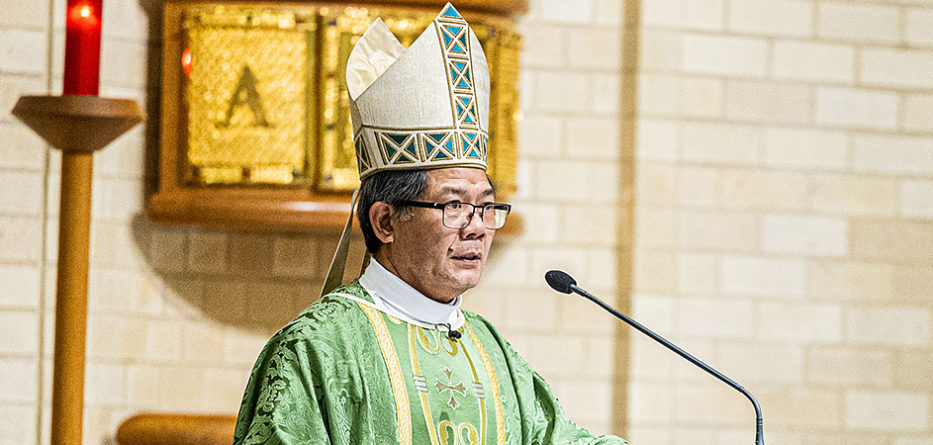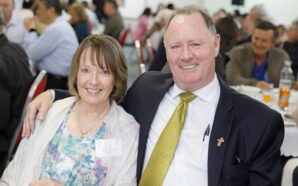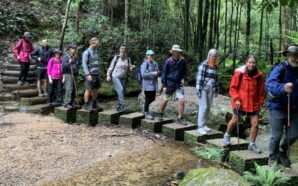Most Reverend Vincent Long Van Nguyen OFM Conv DD STL, Bishop of Parramatta
Vigil Mass for the 20th Sunday in Ordinary Time Year C at St Monica’s Church, Parish of Richmond
Readings: Jeremiah 38:4-6, 8-10; Psalm 39(40):2-4, 18; Hebrews 12:1-4; Luke 12:49-53
A costly discipleship that demands truth-telling and justice
Dear sisters and brothers,
Pope Francis did something quite extraordinary last week. He completed a week-long penitential pilgrimage through Canada to apologise for the Church’s role in the residential school system. For over 100 years, the Christian churches there, with financial support of the government, forcibly removed indigenous children from their homes and families. In this way, they sought to eliminate the culture, language, and religion of the First Nations peoples and assimilate them into European-Canadian society. This systematic integration policy was akin to what Australia did to the “Stolen Generations”. Pope Francis condemned such practices as cultural genocide.
Without formally revoking the Doctrine of Discovery which gave permission for white settlers from Europe to dominate and occupy the land, he affirmed the presence of God in the indigenous culture and way of life. He mourned the colonising mentality and practice that wounded our First Nations brothers and sisters. The evangelisation that was so bound up with colonisation was the legacy that the Pope confronted. He asked the question that we could do well to reflect upon: How could this happen in the community of those who follow Jesus?
Scriptures on this 20th Sunday also speak of a Christian discipleship that is complete, unwavering and costly. It is a kind of commitment that obliges us to ask confronting, uncomfortable and inconvenient questions such as the one the Pope posed to all Christians in view of our colonising history of indigenous people in the name of evangelisation. At the end of the day, the choice to follow Christ that does not lead us to the cross and the place of suffering with victims of injustice is at best questionable and at worst a betrayal of the Gospel.
In the first reading, Jeremiah, known as a weeping prophet, undergoes persecution as a result of his mission. He speaks truth to power in a way that upsets the status quo and those who benefit from it. In today’s episode, he is condemned by the court officials and left to die in a muddy pit. He is rescued at the last minute by the unlikely ally called Ebed-melech, an Ethiopian royal servant.
The truth of the matter is that there is always a risk associated with the disruptor of the status quo. In the digital world, we think of disruptors like Uber, Airbnb, Amazon and so on. But in the spiritual sphere, we too cannot take a countercultural and prophetic stance, like Jeremiah did, and avoid the risk of that stance. Jeremiah shows us what authentic discipleship looks like. It empowers us to live more generously, more trustfully and yet more bravely in the face of adversity.
In the Gospel, Jesus speaks with passion about his mission and what it means to be his disciple. He presents himself as a quintessential disruptor. “I have come to bring fire to the earth, and how I wish it were blazing already”. The fire can only be understood through the prism of his life, death and resurrection. It is the fire of divine energy that emanates from him, burning away all that is evil and radiating God’s love for all humanity and all creation.
Jesus uses very strong images of family divisions to emphasise the importance of authentic discipleship. As a result of following him, father could be divided against the son, mother against daughter… Elsewhere, Jesus employs similar images such as “let the dead bury their dead” or “hating one’s father and mother”. These are part of the language of poetry and hyperbole, designed to provoke and shock the audience out of complacency. The litmus test of Christian discipleship is complete fidelity to the cross in the footsteps of the suffering Messiah. This fidelity would cut through biological bloodlines and traditional structures. The disciples must put the cause of the kingdom over above other considerations.
Dear friends,
The Word of God today speaks to us about the God who does not let us get away with our propensity towards the comfortable status quo. He throws a curveball in our direction at times to wake us from the continuity and amnesia that our culture is addicted to. The prophetic spirit orients us not to social order and cohesion at the expense of truth-telling and justice. As Australian Catholics, we cannot but examine the prosperity we enjoy today that is linked to the oppression of the past. In Jesus, who surrounds himself with the outcast, we see a God of solidarity and vulnerability. In Jesus, we meet a God who disturbs our comfort and who pushes us out to the periphery to be with the least of his brothers and sisters.
God calls us to greater openness to the surprising ways in which he conveys his presence and power. Let us commit ourselves to walk as pilgrims open to be formed and enriched by the journey. May we in all the upheaval and chaos around us learn to act justly, love tenderly and walk humbly with the God of discomfort.








